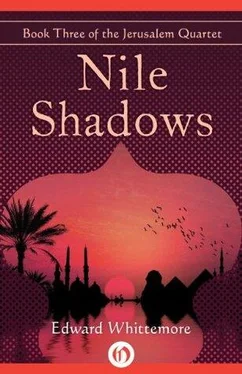Menelik's career of unsurpassed brilliance continued until he was well into his nineties, but long before then he had gone underground completely to live out his days in even greater obscurity, choosing one of his own discoveries as his retirement home, a spacious ancient tomb now to be found beneath a busy public garden beside the Nile. There old Menelik had graciously held court until he died, royally entertaining the few people who knew he existed. And it was this same mausoleum beneath a public garden in Cairo that Ahmad now used as his secret workshop, forging spurious millions for the Monks, as Liffy said.
And thus had ended an astonishing life begun so simply in a child's graffiti of long ago, on that fateful day in the nineteenth century when a little black slave named Boy had dared to raise his eyes on the cotton plantation where he labored, thereby exuberantly defying law and order, and had dared to write on a wall those slashing bold words that were to set free the magic of his yearning soul forever.
HAY.
EYES TIE-ED DRAGIN COTTUN ROUN.
COTTUN AINT FAYROW,
EYE EM.
(s) ZIWAR UF DA DELTER. MI, ZATS ALL.
— 10-
Ahmad
But it was only one tiny part of old Menelik's career that seemed to appeal to Ahmad, not his phenomenal life in general.
Ahmad's intense admiration for the old Egyptologist was focused entirely on that extremely brief period when the young Menelik had worked as a dragoman one winter in Cairo, in order to support himself while beginning his study of hieroglyphs. For it was during that long-ago winter that Menelik and Ahmad's father had conceived the idea for the first dragomen's benevolent society, a forerunner of twentieth-century Egyptian nationalism.
Such vision, said Ahmad to Joe. And what heroic battles they had to fight to get the struggle out of the cafés and into the streets. In those days a dragoman could only find work during the winter tourist season. The rest of the year he had to do without, as did his neglected suffering children, the poor little waifs. For a dragoman in those days, it was rut or perish. During the winter, rich Europeans clamored for a dragoman's services and were willing to pay almost any price to get their hands on him. And then?
What did happen then? asked Joe.
Spring, thundered Ahmad. The crudest season. And not only spring, but spring and summer and autumn.
The tourists stopped coming to Cairo because it was too hot, and those same dragomen who had been the hottest items in town were suddenly rendered cold. Whereas before, a world-weary dragoman had hardly been able to set foot on the veranda of a tourist hotel without being pounced upon by wealthy Europeans in search of the rumored depravities of the Levant, now these same poor slaves to the lusts of foreign exploiters were summarily scorned. Jeered at. Made the butt of rude Italian gestures and abruptly tossed off hotel verandas as if they had become so much superfluous hanky-panky.
But they changed all that, boomed Ahmad. And if you think Trotsky and Lenin set the world on its head, you should have seen what old Menelik and my father did right here in Cairo decades earlier. Fearlessly they went from café to café, convincing their fellow dragomen the time had come to stand up, to shriek, to speak out against these intolerable forced vacations that stretched on from spring through summer to autumn. Oh it was a time of fervor, all right. A time when there was electricity in the air.
I'm beginning to feel it, said Joe. It sounds like a regular spring thundersquall bursting over Cairo, with intellectual lightning just everywhere.
Ahmad whirled on him, his eyes afire, his voice crackling with emotion.
Ram it, he thundered. Up until then dragomen had always been mere rams for hire during the winter season, while being scorned during all other seasons. But no longer. Not after old Menelik and my father launched the Movement. And how did the idea for this great revolutionary crusade begin? This secular jihad to free the toiling masses of dragomandom?
Small, I bet, said Joe. That always seems to be the way.
Ahmad was somber, thoughtful.
Would you believe me if I told you it began in a small way? But always my father was passionately hammering away at the same inspiring theme. . You have to get out of the cafés and into the streets, he said. If you want your power to be felt, organize . If you want to make them listen to you, organize .
There's only one way to change history. Organize.
Straight ahead through the centuries, said Joe. But was old Menelik really so interested in politics as a young man? I'd always heard he was only a dragoman for a winter or so, to make ends meet while he was getting his hieroglyphs together. Do I have it wrong?
Abruptly Ahmad's face darkened.
Menelik went underground, that's all. Down into tombs. But he continued the struggle there.
Oh I see.
And his heart was always aboveground with my father and the cause, said Ahmad, who then began offering up a host of elaborate excuses to explain Menelik's speedy departure from the Movement which made it clear Joe hadn't been wrong at all.
In fact although the idea for a dragomen's benevolent society had originally been Menelik's, the black scholar had lost interest in café agitation almost at once, due to his increasing fascination with buried graffiti and forgotten facts and subterranean reality in general the everyday spadework of Egyptology.
What Ahmad had been referring to when he admitted that the black scholar had gone underground.
But it was also apparent that Ahmad didn't like to dwell on this subterranean aspect of Menelik's life.
And the reason Ahmad couldn't accept these underground truths, refusing even to acknowledge their existence beneath the shifting sands of Egypt, was because he wanted so desperately to believe the founding of a dragomen's benevolent society in Cairo had been the most dramatic event of the nineteenth century, and therefore the most significant cause that anyone could have taken part in then.
And all because that was what his father had done.
Democracy in action, boomed Ahmad, all his old enthusiasm returning. My father and his fellow dragomen discussed everything under the sun as they lounged away the hours in cafés, and there were superb speeches and vivid manifestos, not to mention all the poignant true-life stories that were constantly being retold and retold. The times were alive then, and there was even talk of founding a new nation or a new world-order dedicated to pure dragomanly ideals.
And so we had verandaism, thundered Ahmad. And we had radical nocturnalism and revolutionary hotel-lobby restructuralism, and a revisionist humanist wing with no furniture, and the inevitable backroom lobby filled with cigar smoke, for the disabled. . Oh it was all there. And each faction had its hour of shrill ascendency as the final truth took shape, and then finally the enraged shouts erupted and the fighting slogans were unwound, and the downtrodden dragomen of Cairo rose up as one angry man and marched out of the cafés and into the streets. They just weren't going to take it anymore, and thus was born the International Brotherhood of Dragomen and Touts. Or simply the Brotherhood, as they were known to their supporters. Or the DTs, as their detractors so viciously referred to them.
There's never been any respect for minorities, said Joe.
Ahmad's massive nose flared. He sighed, gripping his powerful fists together.
I have to tell you things didn't turn out well for my father, he said in a quiet voice. In his later years my father became increasingly bitter and eventually refused to see anyone at all, even Cohen and the Sisters, and that's shocking when you think of it. For hadn't their midnight sails on the Nile once been the very talk of Cairo? Those bawdy tender nights when the four of them had dressed up in costumes and drifted riotously on the currents of the great river, drinking champagne from alabaster cups of pure moonlight?
Читать дальше












